Government swings in as EU rejects Uganda’s agricultural produce

Workers prepare flowers for export. Flowers which were ranked among the top-five country’s exporting commodities, suffered setbacks, but players say they are now struggling to get back to business rails. FILE PHOTO
Kampala. Exporters should brace themselves for new measures as government undertakes to address the European Union threat to ban some Ugandan exports.
According to reports, this threat cropped up last year when some countries such as Belgium— one of Uganda’s major EU market destinations— issued a notification following increased number of interceptions of Ugandan horticultural exports.
The main horticultural exports in question include; flowers, hot pepper and other agricultural produce.
Trade ministry’s public relations officer Hadijah Nakakande said there will be a meeting early next week with concerned parties to further negotiate the issue with the aim of getting a solution.
“The concerned ministries will meet all Ugandan exporters to share with them the measures to be undertaken by government to address the matter.”
The meeting with the exporters is scheduled for May 4 at the Uganda Industrial Research Institute conference hall in Nakawa, Kampala.
“Expect the ministers of trade and agriculture to disclose the measure to be followed during this meeting,” Ms Nakakande said.
Genesis
According to information in the notification from Brussels, Ugandan exporters had failed to comply with the phytosanitary (health of plants) certification requirements.
Some of the export commodities on the list of rejection were mainly hot pepper and chillies.
In the notification, they detected traces of live insects (false coding moth) in the mentioned commodities, something which is risky to human lives.
Ideally, a phytosanitary certification is issued to indicate that consignments of plants, plant products or other regulated articles meet specified import requirements and are in conformity with the certifying statement of the appropriate model.
Earlier, government had embarked on training farmers and exporters in the value chain on how to handle the commodities during the post-harvesting period.
Similarly, in an interview with Daily Monitor, Mr John Bosco Lwere, the trade promotion officer at the Uganda Export Promotion Board, said: “The new body called Uganda Fruits and Vegetable Exporters and Producers Association is one of the recommended measures to improve monitoring, compliance and information sharing in the horticulture sector.”
FLORICULTURE
Uganda has been into commercial floriculture since 1993
The industry employs a total of 8,500 people, an average of 30 people per hectare. Of this total, 80 per cent are female.
Approximate Production is in the range of 6,500 tonnes which brings in about $36 million (Shs108 billion) in revenue annually.




